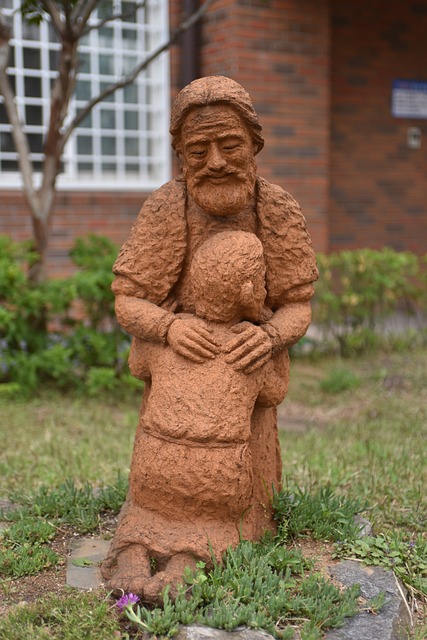Introduction: The concept of forgiveness is central to many religious beliefs, including Christianity. One of the fundamental teachings in Christianity is that God is willing to forgive the sins of those who repent and seek forgiveness. This raises the question: Does God forgive our sins?
Table of Contents
The Power of God’s Forgiveness
Have you ever made a mistake that you deeply regret? Maybe you said something hurtful to a friend in the heat of the moment, or you made a decision that ended up causing harm to someone else. We’ve all been there – we’re human, after all. But what happens when we seek forgiveness for our sins? Does God truly forgive us for our wrongdoings?
The concept of forgiveness is a central theme in many religions, including Christianity. According to Christian belief, God is a loving and merciful being who is willing to forgive us for our sins if we truly repent and ask for forgiveness. This idea is rooted in the belief that God’s love is unconditional and that no sin is too great for God to forgive.
In the Bible, there are countless examples of God’s forgiveness. One of the most well-known stories is that of the prodigal son, who squandered his inheritance and lived a life of sin before returning to his father and asking for forgiveness. Despite his past mistakes, the father welcomed him back with open arms, showing that God’s forgiveness knows no bounds.
But what about our own sins? Are they too great for God to forgive? The answer is no. No matter what we have done, God is always willing to forgive us if we come to Him with a repentant heart. This doesn’t mean that we can continue to sin without consequences, but it does mean that we have the opportunity to start fresh and make amends for our past mistakes.
Seeking forgiveness from God is a deeply personal and spiritual experience. It requires humility, honesty, and a willingness to change. When we confess our sins to God and ask for forgiveness, we are acknowledging our wrongdoing and expressing our desire to make things right. This act of contrition is a powerful way to connect with God and experience His love and mercy.
It’s important to remember that forgiveness is not just about absolving ourselves of guilt. It’s also about healing and moving forward. When we receive God’s forgiveness, we are freed from the burden of our sins and given the opportunity to live a more fulfilling and purposeful life. This doesn’t mean that we will never sin again, but it does mean that we have the strength and grace to overcome our shortcomings and strive to be better.
In the end, the power of God’s forgiveness is a testament to His love and mercy. No matter what we have done, God is always willing to forgive us if we come to Him with a sincere heart. So if you’re feeling burdened by guilt or shame, know that God is waiting for you with open arms, ready to forgive and embrace you. Seek His forgiveness, and experience the transformative power of His love in your life.
Understanding God’s Grace and Mercy
Have you ever made a mistake that you deeply regret? Maybe you said something hurtful to a friend in the heat of the moment, or you made a decision that ended up causing harm to someone else. We’ve all been there – we’re human, after all, and we’re bound to mess up from time to time. But what happens when we make a mistake that feels unforgivable? Does God forgive our sins, no matter how big or small they may be?
The concept of forgiveness is a central theme in many religions, including Christianity. In the Bible, we are told that God is a loving and merciful God who is willing to forgive us for our sins if we repent and ask for forgiveness. This idea of God’s forgiveness is often referred to as His grace and mercy – the idea that God’s love for us is so great that He is willing to forgive us no matter what we have done.
But what does it mean to repent and ask for forgiveness? Repentance is more than just saying sorry – it’s about acknowledging our mistakes, feeling genuine remorse for our actions, and making a conscious effort to change our ways. When we ask for forgiveness, we are humbling ourselves before God and admitting that we are not perfect. We are asking for His mercy and grace to wash over us and cleanse us of our sins.
It’s important to remember that God’s forgiveness is not something that we can earn or deserve. It is a gift that is freely given to us out of His love and compassion. No matter how many times we mess up, God is always there, ready to forgive us if we truly repent and ask for His forgiveness.
But what about those sins that feel too big to be forgiven? What about the mistakes that haunt us and make us feel unworthy of God’s love? The truth is, there is no sin too great for God to forgive. His grace is limitless, and His mercy knows no bounds. No matter what we have done, God is always willing to forgive us if we come to Him with a sincere heart and a desire to change.
It’s easy to get caught up in feelings of guilt and shame when we make a mistake. We may feel like we are unworthy of God’s forgiveness, or that we have strayed too far from His path to be redeemed. But the reality is that God’s love for us is unconditional. He sees us not for our mistakes, but for the potential that lies within us. He wants us to come to Him with open hearts and minds, ready to receive His forgiveness and start anew.
So, does God forgive our sins? The answer is a resounding yes. His grace and mercy are always available to us, no matter how far we may have strayed. All we have to do is come to Him with a repentant heart and a willingness to change. God’s forgiveness is a gift that is freely given to all who seek it. So let go of your guilt and shame, and embrace the love and forgiveness that God offers. You are worthy of His grace, and His mercy knows no bounds.
Seeking Forgiveness for Our Sins

Have you ever found yourself feeling guilty for something you’ve done wrong? Maybe you said something hurtful to a friend, or you made a mistake at work that cost your team time and money. Whatever the case may be, it’s natural to feel remorse when we realize we’ve hurt someone or made a poor choice.
In times like these, many people turn to their faith for guidance and comfort. For those who believe in a higher power, seeking forgiveness for our sins is an important part of maintaining a strong relationship with God. But does God really forgive our sins? And if so, how can we be sure that we have been forgiven?
The concept of forgiveness is a central theme in many religions, including Christianity, Islam, and Judaism. In Christianity, for example, the Bible teaches that God is merciful and forgiving, and that through repentance and faith in Jesus Christ, we can be forgiven of our sins. This idea is echoed in Islam, where believers are encouraged to seek forgiveness from Allah through prayer and good deeds.
But seeking forgiveness is not always easy. It requires humility and a willingness to admit when we have done wrong. It also requires a sincere desire to change our ways and make amends for the harm we have caused. In some cases, seeking forgiveness may also involve seeking forgiveness from those we have wronged, in addition to seeking forgiveness from God.
One of the key aspects of seeking forgiveness is the concept of repentance. Repentance involves acknowledging our sins, feeling remorse for them, and making a commitment to change our behavior. In Christianity, repentance is often seen as a necessary step towards receiving God’s forgiveness. In Islam, repentance is also emphasized as a way to seek forgiveness from Allah.
But what if we continue to struggle with feelings of guilt and shame, even after seeking forgiveness? It’s important to remember that forgiveness is a process, and it may take time to fully let go of our past mistakes. It’s also important to remember that God’s forgiveness is unconditional and that we are all deserving of His mercy and grace.
In the end, seeking forgiveness for our sins is a deeply personal and spiritual journey. It requires honesty, humility, and a willingness to change. It also requires faith in the belief that God is loving and forgiving, and that He is always ready to welcome us back into His grace.
So, does God forgive our sins? The answer is yes. God’s forgiveness is limitless and unconditional. All we need to do is seek His forgiveness with a sincere heart, and He will always be there to forgive us and guide us towards a path of righteousness.
The Importance of Repentance in Receiving God’s Forgiveness
Have you ever found yourself feeling burdened by guilt and shame over past mistakes or wrongdoings? It’s a common experience for many people to struggle with the weight of their sins, wondering if they will ever be able to find forgiveness and peace. The question of whether or not God forgives our sins is one that has been pondered by theologians, philosophers, and everyday believers for centuries. And while the answer may vary depending on one’s religious beliefs, there is a common thread that runs through many faith traditions: the importance of repentance in receiving God’s forgiveness.
Repentance is a concept that is central to many religious teachings, including Christianity, Judaism, and Islam. It is the act of acknowledging one’s sins, feeling genuine remorse for them, and making a commitment to change one’s ways. In Christianity, repentance is often seen as a necessary step in the process of seeking forgiveness from God. The Bible teaches that “if we confess our sins, he is faithful and just to forgive us our sins and to cleanse us from all unrighteousness” (1 John 1:9). This verse emphasizes the importance of acknowledging our sins and asking for forgiveness in order to receive God’s mercy and grace.
In Judaism, the concept of repentance, or teshuvah, is also central to the process of seeking forgiveness from God. According to Jewish tradition, teshuvah involves four steps: acknowledging one’s sins, feeling remorse for them, making amends with those who have been wronged, and committing to change one’s ways. By following these steps, a person can seek forgiveness from God and find reconciliation with both God and others.
Similarly, in Islam, repentance, or tawbah, is seen as a crucial part of seeking forgiveness from Allah. The Quran teaches that “Allah loves those who turn to Him in repentance and loves those who purify themselves” (Surah Al-Baqarah 2:222). By sincerely repenting for one’s sins and seeking forgiveness from Allah, a person can find mercy and grace in the eyes of God.
Regardless of one’s religious beliefs, the importance of repentance in seeking forgiveness from a higher power cannot be overstated. By acknowledging our sins, feeling genuine remorse for them, and making a commitment to change our ways, we can open ourselves up to the possibility of receiving forgiveness and finding peace within ourselves. Repentance is not just about seeking forgiveness from God; it is also about taking responsibility for our actions, learning from our mistakes, and striving to become better individuals.
In the end, the question of whether or not God forgives our sins is one that may never have a definitive answer. But what is clear is that repentance plays a crucial role in the process of seeking forgiveness from a higher power. By acknowledging our sins, feeling genuine remorse for them, and making a commitment to change our ways, we can open ourselves up to the possibility of receiving God’s mercy and grace. So if you find yourself burdened by guilt and shame over past mistakes, remember that repentance is the key to finding forgiveness and peace.
Living a Life of Forgiveness and Redemption
Have you ever made a mistake that you deeply regret? Maybe you hurt someone you care about, or you did something that goes against your values. It’s easy to feel overwhelmed by guilt and shame when we mess up, but the good news is that forgiveness is always possible. Many people turn to their faith in times of need, seeking solace and guidance from a higher power. But does God really forgive our sins?
The concept of forgiveness is central to many religious beliefs. In Christianity, for example, it is believed that God is merciful and compassionate, always ready to forgive those who seek redemption. The Bible is filled with stories of people who have sinned and been forgiven, from the prodigal son to Mary Magdalene. These stories serve as a reminder that no matter how far we may have strayed, there is always a path back to grace.
But seeking forgiveness is not just about saying a few prayers and moving on. It requires true repentance and a commitment to change. In the Christian tradition, this process is known as confession and penance. By acknowledging our sins and asking for forgiveness, we open ourselves up to the possibility of redemption. This act of humility and contrition is seen as a necessary step towards healing and reconciliation.
Of course, forgiveness is not just a religious concept. It is also a powerful tool for personal growth and healing. Holding onto grudges and resentments can weigh us down and prevent us from moving forward. By learning to forgive ourselves and others, we free ourselves from the burden of anger and bitterness. This can lead to greater peace of mind and a deeper sense of connection with others.
But forgiveness is not always easy. It requires us to let go of our pride and ego, to admit our mistakes and shortcomings. It can be a humbling experience, but it is also a liberating one. When we forgive, we release ourselves from the chains of the past and open ourselves up to a brighter future.
So, does God forgive our sins? The answer is yes, but with a caveat. Forgiveness is not a free pass to continue making the same mistakes over and over again. It requires us to take responsibility for our actions and make a genuine effort to change. It is a process that requires patience, humility, and perseverance.
Living a life of forgiveness and redemption is not always easy, but it is worth the effort. By seeking forgiveness from God and from those we have wronged, we can heal old wounds and build stronger relationships. We can learn from our mistakes and grow into better, more compassionate human beings.
In the end, forgiveness is a gift that we give to ourselves as much as to others. It allows us to let go of the past and embrace the present with an open heart. So, if you are struggling with guilt and shame, remember that forgiveness is always possible. Seek guidance from your faith, reach out to those you have hurt, and take the first step towards a life of healing and redemption.
Conclusion
Yes, God forgives our sins if we sincerely repent and ask for forgiveness.
For licensing reasons, we must provide the following notice: This content was created in part with the help of an AI.


